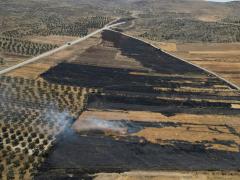Since the mid-1960s, Israel has received significant military and diplomatic support from successive administrations in the United States. But never has it enjoyed such unconditional support as it has in the past eight years – under the first and second administrations of President Donald Trump and the administration of President Joe Biden. As a result, Israel has started openly pursuing its greatest Zionist dream: expanding state borders to achieve Greater Israel and accelerating the ethnic cleansing of the Palestinian people from their homeland.
Although the Israeli state may appear more powerful than ever and overly confident that it will achieve regional dominance, its current position paradoxically reflects a strategic failure.
The reality is that after nearly eight decades of existence, Israel has failed to achieve legitimacy in the eyes of the region’s peoples and lasting security for itself. Its present resurgence will secure neither. And that is because its foreign, domestic and military policies are based on a settler-colonial logic which makes them untenable in the long run.
Settler-colonial mentality
Since its founding in 1948, Israel has sought to convince the world and its Jewish citizens that it was created “on a land without a people”. While this narrative has successfully caught on – particularly among the younger generations of Israelis – the forefathers of the Israeli state openly spoke about “colonisation” and settling a land with a hostile native population.
Theodor Herzl, considered the father of modern Zionism, planned to reach out to well-known British colonialist Cecil Rhodes, who led the British colonisation of Southern Africa, for advice on and approval of his plan to colonise Palestine.
Vladimir Jabotinsky, a revisionist Zionist who founded the far-right Zionist group Betar in Latvia, strategised in his writings on ways to address native resistance. In his 1923 essay The Iron Wall, he wrote:
“Every native population in the world resists colonists as long as it has the slightest hope of being able to rid itself of the danger of being colonised. That is what the Arabs in Palestine are doing.”
This settler-colonial mentality played a central role in shaping the domestic, foreign and military policies of the newly founded Israel. Today, almost 80 years after the creation of the Israeli state, expansionism and aggressive military posturing continue to define the Israeli regional strategy.
Despite official rhetoric about seeking peace and normalisation of relations in the region, the Israeli aspiration to achieve a Greater Israel – one that includes not only occupied Gaza, the West Bank and East Jerusalem, but also parts of modern-day Egypt, Syria, Lebanon and Jordan – persists.
That has been apparent in public discourse and government actions. Settler activists have openly talked about an Israel stretching from the Nile to the Euphrates river. Government advisers have penned articles about “reconquering Sinai”, “dismembering Egypt” and precipitating the “dissolution of Jordan”. Prime ministers have stood in front of the United Nations General Assembly, holding maps of Greater Israel.
The idea of Greater Israel has been widely accepted across the Zionist political spectrum, both on the right and on the left. The primary differences have been in how and when to advance this vision, and whether it requires the expulsion of Palestinians or their segregation.
Expansionist policies have been applied under all Israeli governments – from those led by left-wing Mapai Labor to those led by right-wing Likud. Since the 1949 armistice, Israel has occupied the West Bank, Gaza, East Jerusalem, the Golan Heights, Sinai (twice), southern Lebanon (twice) and now most recently, more parts of southern Syria.
Meanwhile, its colonisation of the occupied Palestinian territories has proceeded at an accelerated pace. The number of Jewish colonial settlers in the West Bank, including East Jerusalem, was approximately 250,000 in 1993; by October 7, 2023, this number had risen to 503,732 in the West Bank and 233,600 in East Jerusalem.
Settlements in Gaza were dismantled in 2005, but plans are being made for recolonisation, as the current Israeli government eyes the full ethnic cleansing of the strip.
Today, there is no major political force in Israel that looks beyond the direct application of naked military power to maintain and protect colonisation activities. This mindset is not limited to politicians but is also a widespread conviction among the Israeli public.
A June 2024 survey found that 70 percent of Jewish Israelis think settlements either help national security or do not interfere with it; a March 2025 poll showed that 82 percent of Jewish Israelis support the ethnic cleansing of Palestinians in Gaza.
No genuine peace camp
The settler-colonial mindset at the core of the Israeli state has precluded the emergence of a genuine drive for peace. As a result, successive Israeli government




